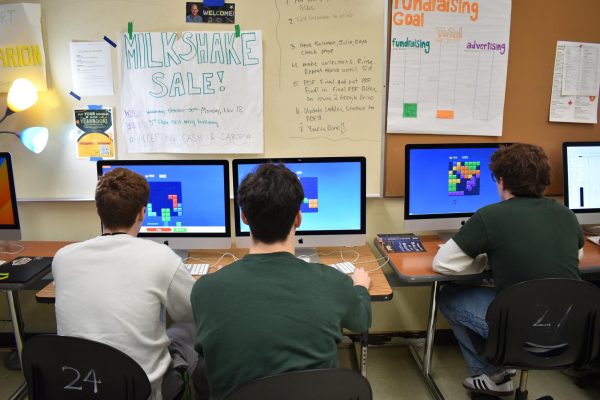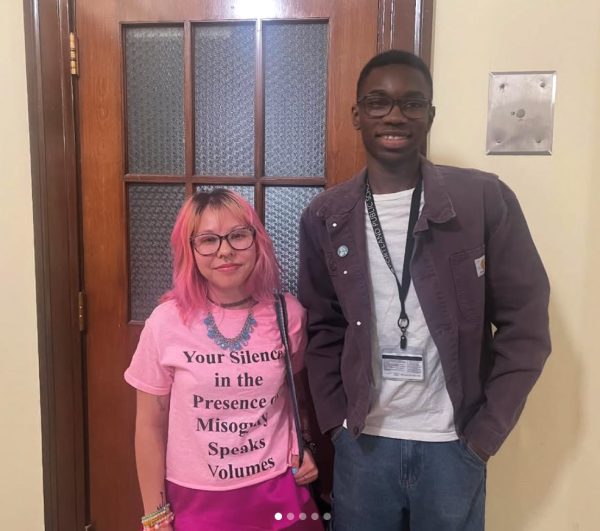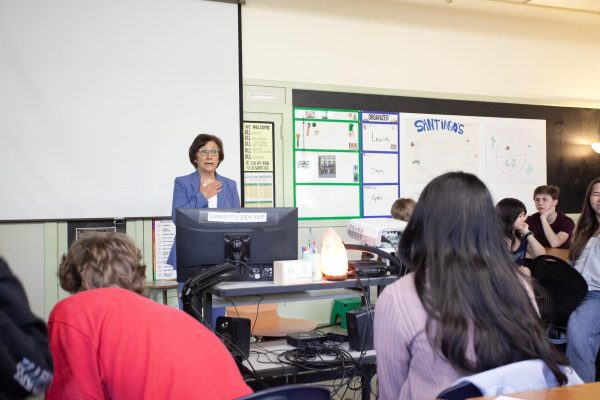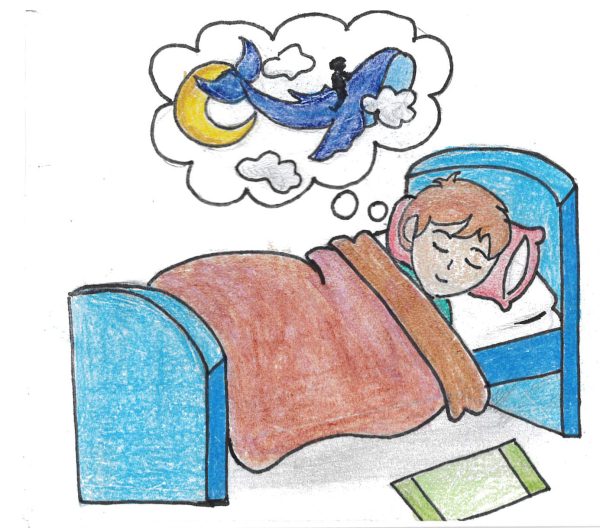The Class of 2017 Facebook Page Heats Up
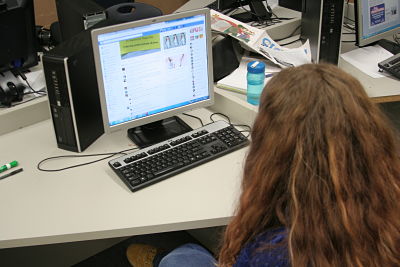
Clarion photo Ashley Lytle
A student reads the growing comment thread on a Facebook post.
More than 120 countries joined together on Feb. 7 to celebrate Safer Internet Day. A day organized by the Insafe Network and the International Association of Internet Hotlines (INHOPE) marked the 14th year that countries have united to encourage making the Internet a safer place. Safer Internet day was first started due to the European Commission’s Safer Internet Program. The 2017 theme was “Be the change: Unite for a better internet.”
Pew Research center reported that in 2015, “92 percent of teens [reported] going online daily — including 24 percent who say they go online ‘almost constantly.’” They also found that 71 percent of teens use multiple social media accounts. In the report, teens were defined as youth ages 13 to 17.
Senior Chris Schetter said that he goes on his social media accounts approximately four times a day. A user of the popular social media networks Instagram and Facebook, Schetter said, “I believe [social media] can increase sociability if you can not be social in person.”
“It’s a great way to meet new people and it’s a place where you can share who you are and show what you’re passionate about along with seeing what family/friends are doing if they live far from you,” expressed junior Kylee Brown.
While social media is thought to have many positive qualities, youth are not blind to the negative qualities it comes with.“Hateful comments and negative or unrealistic expectations being set for people,” were some negatives that senior Lauren Johnson mentioned.
“It takes less courage and effort to start a conversation online. And it’s easier to be mean online because you don’t have to see that person’s reaction, and they’re less likely to say something back or retaliate in any other way,” said senior Alex Larson.
Schetter said that he has experienced bullying on social media. He’s not alone. A 2013 study titled “Youth Risk Behavior Surveillance Survey” found that 15 percent of high school students had experienced some form of cyberbullying within the past year. In 2014, a study by McAfee found that 87 percent of teens have observed cyberbullying.
Have you ever been cyber-bullied? Total Voters: 42
![]() Loading ...
Loading ...
The National Center for Education estimates that in the fall of 2016, there were 15 million students attending high school in the U.S. That means approximately 2.25 million high school students have experienced some form of cyberbullying. This leads people to question how we can make the Internet a safer place, especially for youth.
Cleveland’s Class of 2017’s Facebook page has found out just how difficult social media can be this year. Many posts have led to angry comments, most recently over the spirit week themes for the week of Feb. 13.
Several students found many of the freshmen-designed spirit days to be offensive. On the page, one student commented that just because you’re not single doesn’t mean you can’t dress comfy or that you shouldn’t because you’re in a relationship. Other students expressed anger over the fact that Friday was “Support Our Troops” day, many expressing a wish that it was connected to Black History month instead.
The most recent debate over the spirit week themes is only one conflict the class of 2017 has witnessed this year.
“I think a lot of [the arguments] come from people just wanting to start something, although there are often times valid points to what someone may be saying. It just kind of spirals into a big argument… . I think the arguments begin because people’s voices aren’t being heard and people with valid opinions haven’t been able to voice those. When they do through Facebook and are shut down, there is a lot of frustration. To fix this, I think we really just need to be better at taking in everyone’s opinions and building a stronger community,” expressed co-Student Body President Carlin MacMillan, who is one of the administrators for the Facebook page.
MacMillan’s ideas include involving the student body in the decision making process for events, or at least giving them the ability to give input. Her advice to students is to “resist engaging.”
“People want to spread love and not hate at our school. Then we need to support everyone, even if you don’t believe in [what they are saying],” said Senior Class co-President Emma Rozman. She expressed her wish for students to stop bullying and disrespecting others on the class Facebook page.
“Maybe make [social media] more supportive and nice and somehow prevent people from posting hate comments, posts, etc,” freshman Camilia Saulino suggested. “I know at one point, there was a popular app called Brighten that was focused on complimenting people, and I thought that was nice.”
Junior Sylvan Talavera brought up the controversial argument of free speech and its role in allowing cyber bullying to continue to exist. “Yes, I think [free speech] is important, but I do think it should have its limits. I think that to a certain extent, people should be able to share most ideas, but ideas that degrade other humans, abuse people, are racist/classist/sexist, or create a hierarchy of people shouldn’t be allowed in public… . Although I do believe that, in private, people can have any opinion they want.”
Brown said, “I think people are allowed to speak and share whatever they feel. I don’t think there’s a limit on what you can and can’t say. Everyone should accept each other’s opinion no matter if you agree or not. We all have opinions and we are allowed to share them however we like.”
Schetter pitched the idea of “making [social media platforms] more personal and true to who is posting. Like the goal of the social media platform be me.”
“If you’re responsible and smart, I think social media can be something that’s fun, but if you’re doing something that’s inappropriate or engaging in deep discussions with people on social media, then I don’t think that’s the safest thing to do. I think people do and say things on social media that they aren’t willing to do or say in person,” expressed economics and government teacher, Maxwell Trezise.
As to whether or not Holmes was willing to give up social media she said, “I have given up different ones at different times because they’ve stressed me out or become boring or I’ve lost interest, but I’ve never given them all up at once. I would be willing to try, but I don’t think the experience would be significant or profound or anything.”
Schetter answered the same question with, “Yes, Facebook sucks.” And Brown said, “I would definitely give up social media. It’s cool to have, but if lost or I decided to delete it, I’d be perfectly fine… I think social media has very positive and amazing things, but in my opinion, I think it does more harm. The reason being is because people are so connected to it and are always on it to the point where no one knows how to meet people in real life and have a genuine conversation without their phones.”
“I don’t think I would be able to give up social media because I enjoy it so much and find so many funny videos and posts,” said Larson.
Organizations continue to work towards making the Internet a safer place for all to use. Events like Safer Internet Day continue to help spread awareness on issues Internet usage comes with and ways to prevent them. Students continue to grow more aware through preventative measures of the dangers that exist online which include cyberbullying.
“There are a lot of different opinions that come through the Facebook page. Often it can be beneficial to hear everyone’s thoughts on things, but sometimes it can get to be extremely overwhelming as people don’t think of the repercussions to what they say. Overall, I think it’s a great platform to hear what other people have to say who may not have the chance to let their voice be heard,” said MacMillan.
A press release for Safer Internet day by the European Schoolnet stated, “The theme for the 2017 celebration is ‘Be the change: Unite for a better internet,’ highlighting the fact that we all have a role to play and that, by uniting and working together, we can achieve a safer and better internet for all.”

Position: Editor-in-Chief, Online Editor, Page Editor, Photographer, Videographer
Graduation year: Class of 2017
Favorite thing to do: Hang out with...



